- About
- Members
- Join
- Member log in
- Membership Renewal
- Member directory
- Life Members
- ASPS Life Member Professor Graham Farquhar
- ASPS Life Member Associate Professor Hendrik (Hank) Greenway
- ASPS Life Member Dr Marshall (Hal) D Hatch
- ASPS Life Member Dr Paul E Kriedmann
- ASPS Life Member Dr Mervyn Ludlow
- ASPS Life Member Emeritus Professor Rana Munns
- ASPS Life Member Conjoint Professor Christina E Offler
- ASPS Life Member Professor (Charles) Barry Osmond
- ASPS Life Member Emeritus Professor John W Patrick
- ASPS Life Member Dr Joe Wiskich
- Corresponding Members
- Elected Fellows
- Events
- Awards & Funding
- Employment
- Publications
- Research
- Teaching
- Menu
Read about talented students from ComBio2017
29 June 2018
Biotechnology has always fascinated me for being able to modify the crops for a sustainable agricultural production using foreign genes. After finishing my major in Molecular Biology and Biotechnology (2013) from University of Peradeniya, Sri Lanka, I started applying for PhD positions in Australia to follow my dream to pursue higher studies in plant science. I was privileged to start my PhD in 2015 in the faculty of Veterinary and Agricultural sciences, The University of Melbourne under the guidance of Professor Dr. Paul Taylor and Associate Professor Dr. Derek Russell on canola biotechnology.
Canola, being the second most important oilseed crop in the world and Australia being an important producer, my study focusses on the use of new genes to alleviate abiotic and biotic stresses in canola. I started developing and optimising the tissue culture based gene transformation of canola using rapid-cycling Brassica napus as the model system and used the developed techniques to introduce traits of interests for farmers such as tolerance to frost and diseases.
In 2017, I joined the Australian society for plant scientists (ASPS), a useful society in Australia which helps young scientists to connect, publish and choose career pathways. I was fortunate to win a travel award from ASPS to attend ComBio 2017 held in the convention centre, Adelaide to present some of my research findings. It was a good opportunity to hear from other researchers around the world and to get to know researchers with similar research interests.
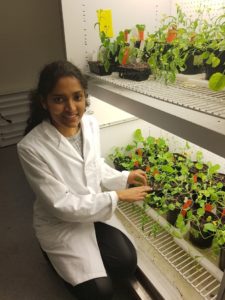
Aruni Alahakoon, Faculty of Veterinary and Agricultural Sciences, University of Melbourne
All plants are subject to diseases caused by different pathogens which can affect food security. Among all these plant pathogens, rust fungi are specialized to different economically important crops such as wheat and barley and can cause substantial crop failure. Due to the increase in human population and emergence of new virulent races of rust pathogen, the identification of new durable sources of resistance is crucial for future crop protection and food security. Therefore, my PhD project involves determination of the genetic and molecular basis of resistance in barley in response to cereal rust pathogens (Puccinia rust pathogens). My work includes resistance gene identification in response to diverse rust pathogens in selected mapping barley populations, subsequent fine mapping analysis with an ultimate aim to discover novel resistance sources in barley that are effective to rust pathogens and can be transferred into other crops.
The ASPS travel grant fund enabled me to attend the COMBIO conference 2017 in Adelaide which was a critical juncture for my professional development. This conference was a great opportunity to present my research to a wide range of experts and research groups in plant science. I had the opportunity to present a major component of my PhD project, which enabled me to improve my oral presentation skills, receive feedback and develop network with scholars within the Australian plant scientific community. The improved results based on the presented work has been published in Phytopathology Journal in May 2018.
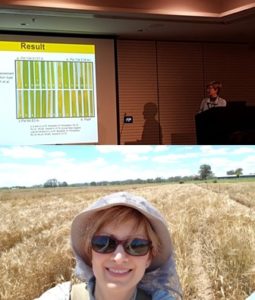
Rouja Haghdoust, PhD student, Plant Breeding Institute, The University of Sydney
My name is Yoav Yichie and I’m a PhD candidate from The University of Sydney. I am in the third year of my candidature, and I’m focusing on the vast genetic diversity of endemic Australian rice species, particularly O. australiensis and O. meridionalis. In my research I deal with one of the most critical issues related to climate change and land management: soil salinity. Salinity affects a significant proportion of arable land globally, and is particularly detrimental for irrigated agriculture, which provides approximately one-third of the world’s food supply. Millions of hectares are technically suited for rice production but are left uncultivated, or give very low yields, because of soil salinity.
There is now a burgeoning interest in native rice species as a source of abiotic stress tolerance genes; however, to date, no work has been published on their salt tolerance.
In my research I use the genetic pool stored in wild relatives of crop species to enrich the genetic diversity and provide improved traits to commercial rice varieties.
Last year I presented some of my research findings at COMBIO 2017, Adelaide. I had the opportunity to discuss my research with some of the most well-known researchers in this field. I met many colleagues and expanded my scientific network. I am grateful to have had the opportunity to share my knowledge and obtain feedback and insights from other researchers from around the globe. I was awarded for the Best Phenotyping Poster by the APPF Plant Phenomics. I wish to gratefully acknowledge the APPF committee who awarded me the poster prize.
I was granted financial assistance to attend and present this poster at ComBio 2017. In this poster, I highlighted the main results of the salt screening experiments, where I managed to establish a core collection of salt-sensitive and tolerant accessions.
Participating in ComBio 2017 was a great experience for me. Firstly, I would like to thank the committee for providing a grant travel that gave me that opportunity. As part of the three-day conference, I attended meetings related to plant development, physiology, technology and abiotic stress. The talks (and the great speakers) enabled me to enrich my knowledge and broaden my understanding of these fields. Moreover, by presenting my poster entitled “High-throughput non-invasive phenotyping reveals salinity tolerance in Australian wild rice species during seedling growth”, I had the chance to obtain feedback and consult with researchers from many disciplines. This experience provided a platform for some useful discussions which will help to strengthen parts of my thesis as well as highlight areas needing further work.
I thoroughly enjoyed the conference and think it was a great opportunity for me at this early stage in my career as a researcher. Networking with scientists from diverse backgrounds and interest has reignited my passion and enthusiasm for science and particularly plant genetics research. I would like to thank The Australian Society of Plant Scientists for awarding me the grant which made my attendance possible.
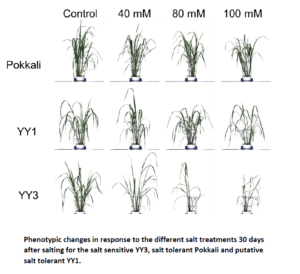
Yoav Yichie, PhD Candidate, Faculty of Agriculture and Environment, School of Life and Environmental Sciences, The University of Sydney
I am Chana Borjigin, a 3rd year PhD student from the University of Adelaide. I grew up on a small farm where I always had a close relationship with different cereal crops like maize, rice, wheat and beans. Following my father to inspect the crops on the farm after school brought so much fun to my childhood life. I started my bachelor’s studies in plant sciences (in the specialization of agriculture sciences) in 2006, and never thought to work or study in any other field in the past 12 years as plants to me is like my beloved pets and I like being with them.
My PhD research is on understanding sodium tissue tolerance in a bread wheat landrace Mocho de Espiga Branca. My poster entitled Identification of Novel Loci and Genes for Salinity Tissue Tolerance in a Bread Wheat Landrace Mocho de Espiga Branca was awarded the ASPS Student Poster Prize at the ComBio 2017 held in Adelaide. I am thankful for ASPS Committee for awarding me the prize. It is the first prize I have ever been awarded in my PhD life and is definitely going to be a great encouragement on continuing my research in plant sciences. Participating and presenting at the ComBio 2017 offered me with a great opportunity to present my research work in front of experts and peers in plant sciences to get constructive comments and exchange ideas. By attending the conference, I was also able to build up potential collaborating networks for my current research, and with a couple of scientists we already have started our collaboration on a part of my PhD project.
I am grateful for being a member of ASPS and looking forward to meeting with all other members again and update my recent research progress at the ComBio 2018 in Sydney!
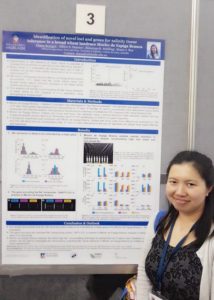
Chana Borjigin, PhD Candidate, School of Agriculture, Food and Wine, University of Adelaide
As recipient of the ASPS travelling fellowship I was given the opportunity to travel to Heidelberg, Germany, famous for its numerous scientific institutes as well as the beautiful scenery. My PhD project in the Gendall lab at La Trobe University involved studying the importance of a class of Na+/H+ exchanger proteins or NHXs in the model plant species Arabidopsis thaliana. These proteins localise to the membrane of various vesicles in the cell which are responsible for the sorting and recycling of cellular cargo proteins. My work in Australia studying these vesicles involved light microscopy studies which are not capable of resolving the structure of these vesicles I am interested in.
Through the generous funding of the ASPS I was able to visit the lab of Prof. Karin Schumacher who is one of the leaders in the plant cell biology field, and whose lab has great experience in using electron microscopy to resolve the ultrastructure of these membrane bound vesicles. After learning how to prepare my plant root samples for imaging under the electron microscopy with guidance from Dr. Stefan Hillmer, we were able to obtain strikingly clear images of a type of cellular vesicle called multi-vesicular bodies (see Figure). I am currently analysing these results to determine if the formation or maturation of these vesicles could be disrupted in plant cells which lack particular NHX proteins. I am grateful to the ASPS for providing me the opportunity to learn valuable skills and techniques overseas which I would not be able to achieve in Australia.
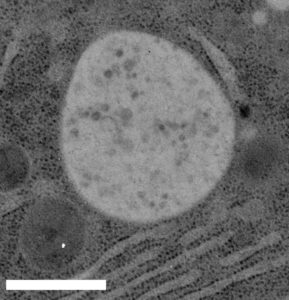
Transmission electron microscopy image of an enlarged multi-vesicular body (white structure) in an Arabidopsis thaliana root cell. The numerous dark structures contained in the multi-vesicular body are intra-luminal vesicles which contain cargo proteins destined to be degraded. Scale bar = 500nm.
Jonathan Dragwidge, PhD candidate, La Trobe University
ASPS has become affiliated with International Journal of Molecular Sciences (IJMS) and Plants.
25 June 2018
News
Recently ASPS has become affiliated with two MDPI journals, International Journal of Molecular Sciences (IJMS) and Plants. The benefits for ASPS members are as follows:
- A 15% discount* on the article processing charges will apply to ASPS members to publish in IJMS and Plants. A limited number of full fee waivers for special cases can also be discussed and agreed on;
- A discount on the article processing charges for selected papers collected from ASPS conferences can be agreed on a case by case basis for non-members;
- Meeting reports of ASPS conferences will be published free of charge in IJMS and Plants;
- Discounted publication fees for open access books;
- Sciforum.net platform for organizing ASPS conferences and conference organizing services at preferential rates. ASPS as well as each of its members will be able to use the platform free of charge if self-managed;
- Promotion of ASPS conference on the journal homepages;
- IJMS and/or Plants will sponsor different activities at the ASPS conferences (e.g. keynote speaker, travel grant for PhD students or Postdocs, best poster awards, coffee breaks, etc.) depending on the annual marketing budget of the journals;
- The possibility to advertise the society news on the website of the journals and social media;
- The possibility for the society and its members to post job announcements free of charge on the websites of IJMS and Plants.
The specific information about IJMS and Plants can be found below
The International Journal of Molecular Sciences (IJMS, ISSN 1422-0067, Impact Factor: 3.226) provides an advanced forum for molecular studies in biology, chemistry and biophysics. Our aim is to provide rigorous peer review and enable rapid publication of cutting-edge research to educate and inspire the scientific community worldwide. IJMS is indexed by the Science Citation Index Expanded (Web of Science), MEDLINE (PubMed) and other important databases. Manuscripts are peer-reviewed and a first decision provided to authors approximately 18 days after submission; acceptance to publication is undertaken in 6.5 days (median values for papers published in 2017).
Plants (ISSN 2223-7747; CODEN: PLANCD) is an open access journal of plant science. Our aim is to encourage scientists and research groups to publish theoretical and experimental results of research in all fundamental and applied fields of plant science. Plants is indexed in BIOSIS Previews (Clarivate Analytics), Scopus and other important databases. Citations are available in PubMed and full-text are archived in PubMed Central. Manuscripts are peer-reviewed and a first decision provided to authors approximately 20 days after submission; acceptance to publication is undertaken in 5.8 days (median values for papers published in 2017).
Register for ComBio2018 today and the GPC is hiring
22 June 2018
Hello ASPS members,
Today is the last day you can register for ComBio2018 and receive the early bird discount. http://www.combio.org.au/combio2018/
If you need to renew your ASPS membership you can use the e-mail address this newsletter was sent to as you login to reset your password then simply renew to get the discounted ASPS member rate. https://www.asps.org.au/renewal
It will be the ASPS 60th anniversary at ComBio2018 so come and be part of our history.
|
Reports from ComBio2017, Student Travel Grants, ComBio2018 C.O.B. today
15 June 2018
Here are Chenchen and Mainul writing about ComBio2017. Hope you manage to get your applications in C.O.B. today for ComBio2018.
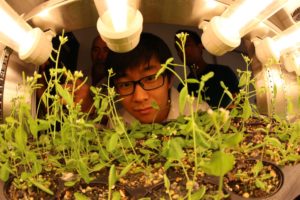
An understanding of the mechanisms which have evolved to allow plants to tolerate drought are crucial to the development of crops which can be productive in adverse climatic conditions.
My PhD project focuses on a retrograde signalling pathway, (3’ –phosphoadenosine 5’-phosphate, PAP), which regulates plant stomatal activity and therefore helps plants to tolerate drought. I am looking at this signalling pathway with an evolutionary perspective and trying to understand the mechanism that has evolved as plants conquered the land during evolution, this process can be also regarded as the first development of adaptations to drought.
If similar mechanisms can be exploited in crop breeding, higher crop yields can be achieved under unfavourable environmental conditions such as drought.
I have used a wide range of techniques in my research including bioinformatics, electro-physiology and genetics. Some of these results were presented on my poster at ComBio-2017. I am grateful that this poster was chosen as the winning student poster by ASPS, and this has also allowed more people to become familiar with my research.
ComBio-2017 was an awesome occasion for researchers. It opened my eyes to new and exciting research and also gave me a chance to meet other researchers in my field. During the poster presentation, ideas and knowledge were exchanged and this has helped me to explore further aspects in my project. I am a proud member of ASPS and am looking forward to participating in future conferences.
Chenchen Zhao, PhD student in School of Science and Health, Western Sydney University
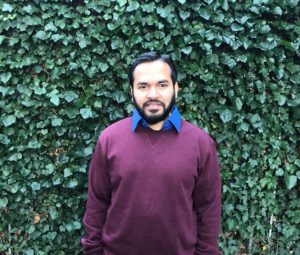
Plants are the most trustworthy friends for mankind. They are equipped with an internal system that can exploit sunlight, water and carbon dioxide being exhaled by humans in order to generate carbohydrate and oxygen which in turn is inhaled by humans. Thus, plants act as primary food producers and play a key role for survival of all other living organisms in the ecosystem. As our global population is rising consistently and expected to reach 9.7 billion from the current 7.3 billion, plant scientists, especially those working with crops face a significant challenge in order to meet this high demand of food and fodder. As different traits such as yield output in plants are regulated by genes, therefore plant scientists are constantly innovating molecular genetics based strategies to tackle this situation. Due to this aspect, I have chosen to pursue a career in plant science.
The Australian Society of Plant Scientists (ASPS) is a community which is contributing towards the aforementioned crisis at the national and international level. Scientists of this organization include some of the leading members in their respective fields whose entire life is dedicated towards unveiling solutions for feeding the hungry mouths around the world. The travel grant offered to me by ASPS for attending Combio 2017 conference at the Adelaide Convention Centre, Adelaide was a significant boost for a young early career scientist like myself because I could present a poster about my PhD research work on flowering time regulation in garden pea which is relevant for yield outcome, and thus received constructive feedbacks from some of the experts in the field. Likewise, I learned the skill of presenting the work of my entire thesis within two minutes by participating in a poster teaser session. Besides, I gained much needed knowledge about the research work being conducted by some of my peers as well as senior members of the society to address various burning issues such as improving different yield parameters, biotic and abiotic stress tolerance, symbiotic relationship development with friendly microbes and so on. Moreover, I was able to network with other PhD students and other scientists specifically by attending the conference dinner where the president of the society, Professor Sergey Shabala gave us an overview about the current status of ASPS in comparison to some major countries and some of the key responsibilities that ASPS members need to carry out to take the organization to an even higher level.
Overall, attending this conference assisted me to become a better professional which would in turn help me to develop myself as a future leader in this field, and thereby disseminate my knowledge among the next generation of plant scientists who can then take up the baton to deal with global food security.
A S M Mainul Hasan, PhD student in School of Biological Sciences, University of Tasmania
Apply for ComBio student travel grant now! and GPC June e-bulletin
08 June 2018
Hello ASPS members,
ComBio2018 will mark the 60th anniversary of our society and is a great opportunity for the next generation of plant scientists to share their research and passion for plants with our community. As a society we provide travel grants to support our student members to attend ComBio. If you are a student attending ComBio or the supervisor of a student attending ComBio this year apply for a travel grant by COB June 15th 2018.
Further details can be found at the ASPS ComBio travel grant web page.
ComBio2018: 23 – 26 September 2018, International Convention Centre Sydney, Darling Harbour
Early Registration & Abstract Deadline: Friday, 22 June 2018
We are pleased to advise that the Program Timetable and the Provisional Symposium Schedule can be downloaded from:
http://www.combio.org.au/combio2018/program.html
The Provisional Symposium Schedule includes the Stream Co-ordinators, the titles of each of the 73 sessions and the Chairs of each of the sessions.
Online registration and abstract submission will be available towards the end of April 2018 and we will send a further email when these pages are live. The early registration and abstract submission deadline is 22 June 2018.
ComBio2018 is a combination of six societies holding their annual meetings with the International Society of Differentiation partnering with the Australia and New Zealand Society of Cell and Developmental Biology, and the New Zealand Society for Biochemistry and Molecular Biology and the New Zealand Society of Plant Biologists joining in with the Australian Society of Biochemistry and Molecular Biology and the Australian Society of Plant Scientists.
The ASBMB Grimwade Keynote Plenary Lecturer is Randy Wayne Schekman. Professor Schekman is a Nobel Prize-winning American professor of molecular and cell biology at the University of California, Berkeley whose research in vesicular trafficking is highly relevant across both plant and animal systems. The ASPS is pleased to support two plenary lectures, including the R.N. Robertson Award & Lecture, which will be given by Dr Michael Udvardi (Noble Research Institute) and the ASPS Jan Anderson Award & Lecture (speaker TBC). The ASPS in conjunction the Annals of Botany and Functional Plant Biology will deliver the Annals of Botany Lecture to be given by Professor Keiko Torii (University of Washington) and the ASPS Peter Goldacre Award Dr Caitlin Byrt. The names and institutions of all confirmed international plenary speakers can be seen at: http://www.combio.org.au/combio2018/plenary.html
| ComBio2018 Program
www.combio.org.au If you can still read this message after the webpage has finished loading, then your browser may not be capable of using CSS to display this site correctly. |
|
World Environment Day Tuesday 5th June 2018
01 June 2018
Hope you manage to reflect on your efforts this coming World Environment Day, Tuesday 5th June 2018.

This years theme is Beat Plastic Pollution.
BENEFITS TO APPLY FOR THE PLANT NUTRITION TRUST FUND
01 June 2018
PLANT NUTRITION TRUST REPORT
by
Wenli Ding
University of Western Australia
It was really an honour to be awarded the Plant Nutrition Trust Award. I attended the International Plant Nutrition Colloquium from 21st to 24th August 2017 in Copenhagen. I have to say, this was really a professionally rewarding experience.
As an international conference, there were lots of interesting talks, especially those from the keynote speakers. The speakers not only informed us of what has been studied in the research areas, but also speculated about new developments for the future. I gained new insights into research experimentation, which can be hard to obtain through reading papers. For example, how to use X-ray fluorescence microscopy to get the plant nutrient distribution in plant tissues. As a young researcher, this was really an eye-opening opportunity for me.
The conference was definitely a great chance to socialise with researchers from all over the world. I tried to introduce myself to some professors after their talks or during the conference breaks. We discussed their research and outlined connections to my own research investigations. This provide me with ideas to help advance my own research. In particular, one professor showed genunine interest in offering me a postdoc position. Attending academic conferences is a great way for young researches to build academic connections and invaluable experience.
Most importantly, I presented a poster at this conference, and gave a 3-min talk in the speaking corner about what I discovered and what I propose to do in the future. Even though it is not the same as giving a seminar in the big hall, I did advance my speaking skills and answering people’s questions was a good challenge. I also learned more about my own research through explaining areas of my research that were confusing to others and listening to their invaluable suggestions.
In summary, I acquired genuine new knowledge related to my research area and developed new relationships with key professors in the area of plant nutrition. I have also learned how to explain myself and convince others of my research ideas and findings. These experiences were most definitely helpful in advancing my own research career. Finally, I want to say thank the Plant Nutrition Trust committee, for giving me the chance to use the funds and attend such an amazing conference.
Contact: Wenli Ding
OXYGEN SENSING AND PLANT NUTRITION
01 June 2018
PLANT NUTRITION TRUST REPORT
by
Feifei Wang
School of Land and Food, University of Tasmania
I am honored to receive Plant Nutrition funding support to attend the 19th International Botanical Congress (IBC) in China. The conference was hold in Shenzhen during July 23rdto 29th, 2017, under the auspices of the International Union of Biological Sciences (IUBS), through the International Association of Botanical and Mycological Societies (IABMS) of the IUBS. Many world’s top experts present their exciting new findings in major plenary sessions and in a wide array of symposia. During the conference, I made one oral presentation named “Oxygen sensing in plant roots linked with ion channel operation: Revealing the roles of calcium transporters in response to hypoxia and salinity in Arabidopsis” in “Calcium transport and signaling” symposium on Friday, 28thJuly. After my presentation, many questions were asked about the possibility and potential role of TPC1 channel as oxygen sensor in plant. We also talked about the TPC1 function under combined hypoxia and salinity stress. One conference paper was published on line after this conference, and I also gained some new knowledge and skills through this conference.
Finally, thanks for giving me this chance to the conference. I really appreciate that. It indeed improved my research ability and profiled my research project. Thanks again.
Contact: Feifei Wang
A SWEET TRUST FOR PHOSPHATE IN PROMOTING PLANT NUTRITION
01 June 2018
PLANT NUTRITION TRUST REPORT
by
David Minemba
University of Western Australia
Introduction
As recipient of The Plant Nutrition Trust Award, I visited LSU AgCenter and its Sweet Potato Research Station in Chase, Manroe. It also coincided with the Annual International Meeting of America Society of Agronomy, America Society of Soil Science and Crop Science Society of America and I attended as a member at Tampa Convention Centre, Florida.
LSU AgCenter, Sweet Potato Research Station conducts pioneering research on role of phosphorus on sweet potato root structure and architecture. This work compliments my PhD research project aimed at understanding root rhizosphere properties of sweet potato in low Phosphate soils. I also attended the meeting in Tampa purposely to meet and network with other international researchers who are involved in related studies to my PhD research project. I met many graduate students working on fields related to root rhizosphere as well as functions of microbial community that exists in the soil.
This report highlight activities and contact made with other researchers on this trip.
Sweet Potato Research Station in Chase, Monroe
The LSU AgCenter Sweet Potato Research Station in Chase is devoted mainly to sweet potato research and development in the United States of America. Its mission is to produce and supply high quality seed stock to commercial sweet potato growers and conduct research in various disciplines to support the industry in the country. Some of the commercial sweet potato varieties used around the world, including Beauregard were developed from LSU AgCenter.
Research into understanding the root system architecture and role of external soil nutrients on root development and storage root formation of sweet potato conducted at AgCenter is at very advanced stages. Variability in storage root yield of sweet potato is quite common in every country that grow sweet potato and remains a challenge. Understanding the root rhizosphere properties could potentially explain this variability and is the focus of my PhD research project. The pioneering work on sweet potato root system architecture at LSU AgCenter by Prof Villordon compliments research interest and was the main basis of many productive interaction during my visit.
LSU, AgCentre
The AgCenter at Louisiana State University hosts a wide range of disciplines in agriculture. One is the plant pathology section. I had the opportunity to spend some time with Dr Chris Clark, a plant pathologist involved mostly in sweet potato pathogens. Dr Clark has many year of experience and has documented most sweet potato pathogens known in the USA and elsewhere. I also had useful conversations with Mrs Mary Hoy, a tissue culture specialist who manages supply of tissue cultured plantlets to the clean seed supply system.
Dr Clark and I had conversations on the potential role of root exudates and its interactions with microbial community in the soil and its effect on soil borne pathogens of sweet potato. My study on measuring the root exudates and the microbial community could potentially contribute to understanding the effects of microbial agents on soil borne pathogens of sweet potato.
The Conference in Tampa, Florida
The American Society of Agronomy, crop Science Society of America and Soil Science Society of America had their 2017 Annual International Meeting with the theme “Managing Global Resources for a Secure Future” in Tampa, Florida. I attended that meeting as recommended by Prof Arthur Villordon, who is my co supervisor, as it is a good opportunity to meet and network with scientist and resource people around the world.
Perceived benefits from my travel and visitations
Confirming the knowledge gap and building confidence
The discussion I had with Dr Villordon, who published widely on topics related to the role of phosphorus on sweet potato root system and architecture, indicated that my research on understanding the rhizosphere properties of sweet potato will certainly add value to knowledge gap needed to resolved persistent variability in storage root yield of sweet potato known to exist in many countries. This also gave the confidence that my work has relevance and a source of inspiration to complete well my remaining experiments and successfully complete my PhD study.
Identified potential collaborations
My visit to LSU AgCenter also stimulated discussions on collaboration work as an extension to my PhD research project. Dr Villordon has offered to provide his expertise as best as he could from his experience elsewhere on projects similar to the proposed collaborations.
I also had cross discipline discussions with Dr Chris Clark, a sweet potato disease specialist. He has an opinion that the root exudates and microbial community in the root rhizosphere could potentially suppress effects of soil borne pathogens of sweet potato. My next experiment has an object to unveil the microbiome in the root rhizosphere of sweet potato cultivars at different P rates. Hope a potential candidate microbial agent be identified from this work and hopefully that could further developed into a collaborative partnership.
Improved on a research technique
I had issues in establishing a good Phosphate response curve in my experimentation. I can now improve on that from tips I learned from Dr Villordon. He demonstrated that very contrasting P response can be achieved by establishing sweet potato from zero P medium to drain out the P reserves in the stem cutting and shoots before transplanting in trials pots. This will greatly assist in developing very contrasting response difference needed for my next experiment.
Collection of relevant literature and publications
Dr Villordon had a more updated collection of literature on sweet potato research in the world. He provided me the copy and that will greatly add value to improving my literature review section of my thesis.
I made good contact with resource people
At the Annual International Meeting in Tampa, I made a good number of contacts with graduate researchers and specialist in areas related to my research work. We exchanged contact information and I look forward to make contact with them during the cause of my study and beyond.
Acknowledgements
This productive trip would not have been possible without the funding support from Plant Nutrition Trust Award and I am grateful to Dr Peter Ryan and his team for this funding opportunity. I also acknowledge the support from UWA Graduate Research School.
My supervisors Associate Prof. Megan Ryan and Prof. Arthur Villordon have not only suggested for me to take trip but have given me all the support needed to make this trip to the United States very successful. I thoroughly enjoyed it and was truly a fulfilling experience in my PhD journey. I had pleasant interactions with Dr Chris Clark and Mrs Mary Hoy at LSU AgCenter. They allowed me to appreciate sweet potato disease in relation my research focus and also gave me the opportunity to visit LSU Rural Life Museum. Finally, the hospitability I got from Ms Susan Karimiha at Baton Rouge and Prof Arthur and family at Manroe were second to none for which I am very thankful.
Contact: David Minemba
Plant Nutrition for Global Green Growth
01 June 2018
PLANT NUTRITION TRUST REPORT
by
Cui Li
I am honoured to be one of the recipients of The 2017 Plant Nutrition Trust Award, granted by Australian Society of Plant Scientists. Thanks to this generous support, I attended my very first International Plant Nutrition Colloquium (IPNC), combined with Boron and Manganese satellite meetings, held in Copenhagen, Denmark, from 19 to 24 August 2017.
I am a third year PhD student from School of Agriculture and Food Sciences, The University of Queensland, Brisbane. My study area is on the absorption and translocation of foliar-applied nutrient fertilizers. The IPNC was the best conference that I have attended. Not only because the topic of the conference suited my study area, but also because it inspired through high quality of seminars and and poster presentations. This was especially true for the keynote presentations, which were given by world-leading scientists within the field.
The main theme of the 18th IPNC was: “Plant Nutrition for Global Green Growth”. Indeed, the conference involved presentations on macronutrients such as nitrogen, phosphorus, and calcium, and micronutrients such as zinc, manganese, and boron. Furthermore, a range of plant species were considered, from arabidopsis and rapeseed to wheat and rice, with the focus of the research also being diverse, from nutrient transporters to next generation fertilisers. For example, I particularly enjoyed the keynote presentation given by Marta Vasconcelos titled “Impact of climate change on plant nutrition” which illustrated the effects of increasing atmospheric CO2 on crop growth and nutrient status. This presentation encouraged me to think of the study of plant nutrition at a more interdisciplinary level – not only should we study the relationship between plants and nutrients, but also we should consider the effects of other factors on plant nutrition such as the changing climate, the succession of nutrients in soil agriculture system, and the increasing human population as well as decreasing land area. I also enjoyed the presentation by Jianfeng Ma titled “Molecular mechanisms for distribution of mineral elements in plants” which was inspiring in that it clearly explained how nutrients are allocated and transported within plants, giving consideration to symptoms we can see using our naked eye to the underlying physiology and molecular mechanisms. I also benefited a lot from the keynote presentations by Peter Kopittke and Søren Husted which shared new analytical methods and techniques can be used in the field of plant nutrition with clear examples.
On the 22nd August, I gave an oral presentation about my PhD research, entitled “Understanding how foliar-applied Zn fertilizer moves across the leaf surface in sunflower and soybean”. A particular focus of my presentation was describing a novel role for trichomes in the absorption of foliar-applied nutrients. My research drew the attention of Victoria Fernandez who is a well-known scientist in the field of foliar fertilisation and who also a keynote speaker at the IPNC. We had a lengthy discussion with interest, and she insightful suggestions. Most importantly, she expressed her interest to collaborate in the future, with this being an important achievement for me at this conference. There were also others who presented their work within the topic of foliar fertilisation. These presentations provided an overview of the current studies and showed that the mechanisms of foliar nutrients absorption and translocation are still not fully understood. It is also interesting that it was found that foliar fertilisation is often not helpful for plants that are already severely nutrient stressed, thus it is important to develop methods that can recognise plant nutrients deficiency at the early stages. The photo shows Victoria Fernandez (right side) and myself.
I truly appreciated the generosity and support of the Plant Nutrition Trust Travel Awards. I have gained knowledge, expanded my horizons, and met face-to-face with researchers from all over the world in the field of plant nutrition. Moreover, it has firmed my determination to continue as a researcher within the field of plant nutrition!
Contact: Cui Li
12
Recent Posts
Tags
Archives
- June 2025
- May 2025
- April 2025
- March 2025
- February 2025
- January 2025
- December 2024
- November 2024
- October 2024
- September 2024
- August 2024
- July 2024
- June 2024
- May 2024
- April 2024
- February 2024
- January 2024
- November 2023
- October 2023
- September 2023
- August 2023
- July 2023
- June 2023
- May 2023
- April 2023
- March 2023
- February 2023
- December 2022
- November 2022
- October 2022
- September 2022
- August 2022
- July 2022
- June 2022
- May 2022
- April 2022
- March 2022
- February 2022
- January 2022
- December 2021
- November 2021
- October 2021
- September 2021
- August 2021
- July 2021
- June 2021
- April 2021
- March 2021
- February 2021
- January 2021
- December 2020
- November 2020
- October 2020
- September 2020
- August 2020
- July 2020
- June 2020
- May 2020
- April 2020
- March 2020
- February 2020
- January 2020
- December 2019
- November 2019
- October 2019
- September 2019
- August 2019
- July 2019
- June 2019
- May 2019
- April 2019
- March 2019
- February 2019
- January 2019
- December 2018
- November 2018
- October 2018
- September 2018
- August 2018
- July 2018
- June 2018
- May 2018
- April 2018
- March 2018
- February 2018
- January 2018
- December 2017
- November 2017
- October 2017
- September 2017
- August 2017
- July 2017
- June 2017
- May 2017
- April 2017
- March 2017
- February 2017
- January 2017
- December 2016
- November 2016
- October 2016
- September 2016
- August 2016
- July 2016
- June 2016
- May 2016
- April 2016
- March 2016
- February 2016
- January 2016
- December 2015
- November 2015
- October 2015
- September 2015
- August 2015
- July 2015
- June 2015
- May 2015
- April 2015
- March 2015
- February 2015
- January 2015
- December 2014
- November 2014
- October 2014
- September 2014
- August 2014
- July 2014
- June 2014
Copyright 2017 Australian Society of Plant Scientists Disclaimer & Privacy
Website by Michael Major Media





